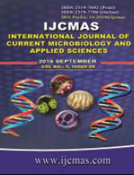


 National Academy of Agricultural Sciences (NAAS)
National Academy of Agricultural Sciences (NAAS)

|
PRINT ISSN : 2319-7692
Online ISSN : 2319-7706 Issues : 12 per year Publisher : Excellent Publishers Email : editorijcmas@gmail.com / submit@ijcmas.com Editor-in-chief: Dr.M.Prakash Index Copernicus ICV 2018: 95.39 NAAS RATING 2020: 5.38 |
The present work was aimed for assessing the quality (physico-chemical and bacteriological) of water samples collected from 07 different locations of Hukumpeta Mandal, Visakhapatnam district, Andhra Pradesh, India in 2014-2015. The study was subjected for physico-chemical and bactrioiological analysis’s involving parameters pH, Turbidity, Electric Conductivity (EC), Total Dissolved Solids (TDS), Total Hardness (TH), Calcium, Magnesium, Chloride, Fluoride, Sulphate, Nitrite ,Dissolved oxygen(DO) etc and microbial analysis (Heterotrophic plate count, faecal coliforms, E.coli and faecal steptroccoi), was performed (APHA,2005). On comparing the results against the drinking water quality standards lead by BIS and WHO, it was found that some parameters namely, EC, Turbidity, Total solids, Calcium, Magnesium, and DO were higher than the prescribed limits while other parameters, Fluorides, sulphates, nitrates, chlorides and total solids were observed to be lower than the limits. Bacteriological examination based on MPN/100 ml of sample, revealed that 90% of samples do not meet Bureau of Indian Standards BIS & World Health Organization (WHO) standards. Most Probable Number (MPN) count ranges between 14-1100MPN /100ml.The faecal coliform counts ranged between 0.32 x 104 CFU/100ml to 4.0 x 104 CFU /100 ml, exceeding the standard limit of BIS, 2006. Isolated and identified organisms were Escherichia, Staphylococci, Salmonella, Shigeila species, Vibrio species, Pseudomonas species, Aeromonas etc. The results indicate that prevalence of water borne diseases may be usually related to the source of drinking water. These interrelated effects have definite impact on developmental efforts and health status of the tribal community, and needed treatment before consumption.
 |
 |
 |
 |
 |